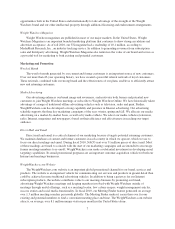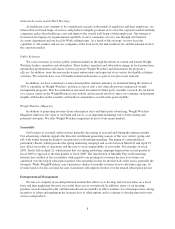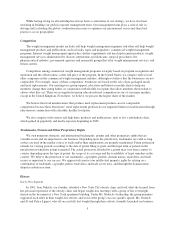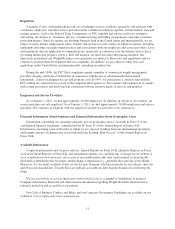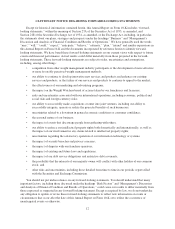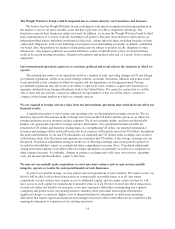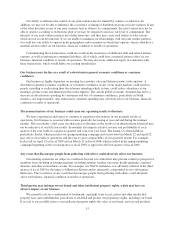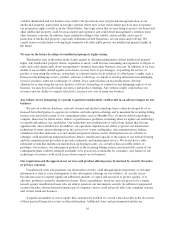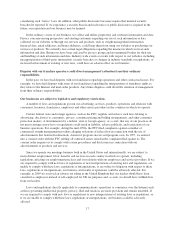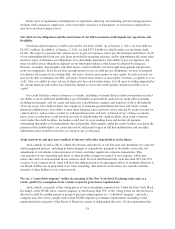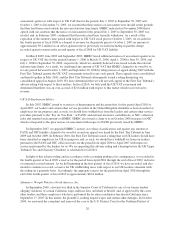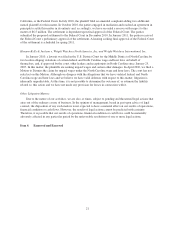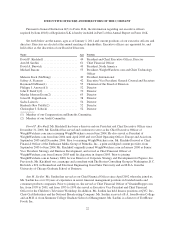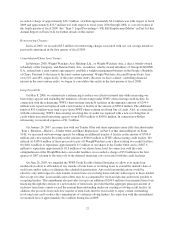WeightWatchers 2010 Annual Report Download - page 33
Download and view the complete annual report
Please find page 33 of the 2010 WeightWatchers annual report below. You can navigate through the pages in the report by either clicking on the pages listed below, or by using the keyword search tool below to find specific information within the annual report.considering such “notice” laws. In addition, other public disclosure laws may require that material security
breaches be reported. If we experience a security breach and such notice or public disclosure is required in the
f
uture, our reputation and our business may be harmed.
I
n the ordinary course of our business, we collect and utilize proprietary and customer information and data
.
Privacy concerns among prospective and existing customers regarding our use of such information or dat
a
collected on our websites or through our services and products, such as weight management information,
f
inancial data, email addresses and home addresses, could keep them from using our websites or purchasing our
services or products. We currently face certain legal obligations regarding the manner in which we treat such
information and data. Businesses have been criticized by privacy groups and governmental bodies for their use
and handling of such information and data. Industry-wide events or events with respect to our websites, includin
g
misappropriation of third-party information, security breaches or changes in industry standards or regulations, or
increased enforcement of existing or new laws, could have an adverse effect on our business.
Di
sputes w
i
th our
f
ranch
i
se operators could d
i
vert management
’
s attent
i
on
f
rom the
i
r ord
i
nary
r
es
p
ons
i
b
i
l
i
t
i
es
.
I
n the past, we have had disputes with our franchisees regarding operations and other contractual issues. Fo
r
example, we have had disputes with some of our franchisees regarding the interpretation of franchisee rights as
they relate to the Internet and mail-order products. Any future disputes could divert the attention of managemen
t
f
rom their ordinary responsibilities.
O
ur bus
i
nesses are sub
j
ect to leg
i
slat
i
ve and regulatory restr
i
ct
i
ons
.
A
number of laws and regulations govern our advertising, services, products, operations and relations wit
h
consumers, licensees, franchisees, employees and other service providers in the countries in which we operate
.
Certain federal, state and foreign agencies, such as the FTC, regulate and enforce such laws relating to
advertising, disclosures to consumers, privacy, consumer pricing and billing arrangements, and other consumer
p
rotection matters. A determination by a federal, state or foreign agency, or a court, that any of our practices d
o
not meet existing or new laws or regulations could result in liability, adverse publicity, and restrictions of our
business operations. For example, during the mid-1990s, the FTC filed complaints against a number o
f
commercial weight management providers alleging violations of federal law in connection with the use of
advertisements that featured testimonials, claims for program success and program costs. In 1997, we entere
d
into a consent order with the FTC settling all contested issues raised in the complaint filed against us. The
consent order requires us to comply with certain procedures and disclosures in connection with our
advertisements of
p
roducts and services.
S
ince we operate our meetings business both in the United States and internationally, we are subject t
o
many distinct employment, labor, benefits and tax laws in each country in which we operate, includin
g
r
egulations affecting our employment practices and our relations with our employees and service providers. If we
are required to comply with new laws or regulations or new interpretations of existing laws and regulations, are
unable to comply with these laws, regulations or interpretations, or are subject to litigation with respect to thes
e
laws, regulations or interpretations, our business and results of operations could be adversely affected. Fo
r
example, in 2009 we received an adverse tax ruling in the United Kingdom that our leaders should have been
classified as employees instead of self-employed for UK tax purposes and, as such, we should have withheld tax
f
rom our leaders.
L
aws and regulations directly applicable to communications, operations or commerce over the Internet such
as those governing intellectual property, privacy, libel and taxation, are more prevalent and remain unsettled. If
we are required to comply with new laws or regulations or new interpretations of existing laws or regulations, o
r
if we are unable to comply with these laws, regulations or interpretations, our business could be adversel
y
affected.
1
7


